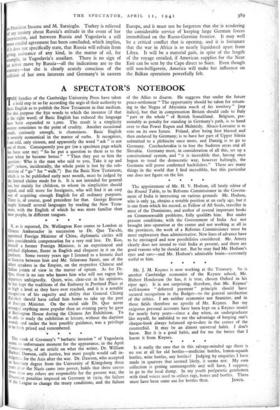A SPECTATOR'S NOTEBOOK
fil HE Syndics of the Cambridge University Press have taken I a bold step in so far according the aegis of their authority to Basic English as to publish the New Testament in that medium. For this purpose the 850 words to which the inventor (if that is the right word) of Basic English has reduced the language have been expanded to 1,000. The result is a simplicity austere sometimes to the point of crudity. Another occasional result, curiously enough, is clumsiness. Basic English is severely economical in the matter of verbs. It recognises, I am told, only sixteen, and apparently the word " ask " is not one of them. Consequently you get (on a specimen page which has been sent me) "So he put a question to them as to the hour when he became better." "Then they put to him the question: Who is the man who said to you, Take it up and go?" (where, incidentally, the whole point is lost by the sub- stitution of " go " for "walk.") But the Basic New Testament, which is to be published early next month, must be judged by the limited claims made for it. It is not intended for general use, but mainly for children, to whom its simplicities should appeal, and still more for foreigners, who will find it an easy way of acquiring enough English for all ordinary purposes. There is, of course, good precedent for that. George Borrow taught himself several languages by reading the New Testa- ment, with the English of which he was more familiar than most people, in different tongues.






























 Previous page
Previous page